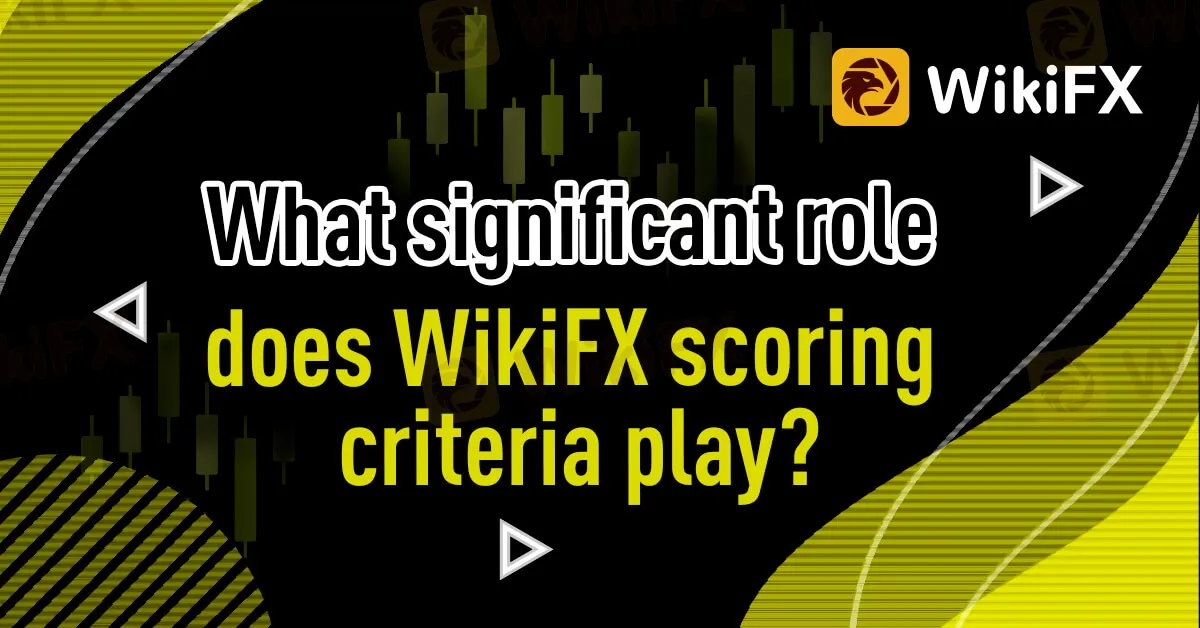简体中文
繁體中文
English
Pусский
日本語
ภาษาไทย
Tiếng Việt
Bahasa Indonesia
Español
हिन्दी
Filippiiniläinen
Français
Deutsch
Português
Türkçe
한국어
العربية
What significant role does WikiFX scoring criteria play?
Abstract:The WikiFX scoring criteria gives you a direct visual method to justify whether a broker you are looking at is good or not. In today’s article, we will explore the importance of the WikiFX scoring criteria.

About WikiFX
WikiFX is an authoritative global inquiry platform providing basic information inquiry and regulatory license inquiry. WikiFX can evaluate the safety and reliability of more than 36,000 global forex brokers. WikiFX gives you a huge advantage while seeking the best forex brokers.
A. Scoring Criteria
WikiFX gives brokers a score from 0 to 10. The higher the score is, the more reliable the broker is.
| The Scoring Criteria of Brokers on WikiFX |
| License index: reliability and value of licenses |
| Regulatory index: license regulatory strength |
| Business index: enterprise stability and operational capability |
| Software index: trading platform, instruments, etc |
| Risk Management index: the degree of asset security |
WikiFX scoring criteria gives you a direct visual method to justify whether a broker you are looking at is good or not.
On WikiFX, if a broker scores between 7 and 10, That means this broker is a WikiFX-recognized excellent broker. These brokers are regulated by regulatory authorities. This means that anyone investing in these brokers doesnt have to worry about them being scammers and taking your money away fraudulently. Such dealers also tend to have few complaints from traders. WikiFX advises you to invest in those brokers if you want to enjoy a good trading experience.


On WikiFX, there are many dealers who score between 4 and 7. Most of these brokers are not scams and are regulated by local regulatory authorities. WikiFX tends to receive complaints from users about them, but not too many. Another important reason why the score of such brokers is not too high is that their risk management abilities are poor. When faced with emergency situations, they cannot find suitable solutions or do not have enough funds to operate.

On WikiFX, there's a class of brokers whose scores range from 0 to 4. These types of brokers are basically scams. They are unregulated, which means your money is not protected if you invest. Even worse, some of them get involved in Ponzi schemes. Investing in those brokers is extremely risky for your fund's safety as they may take your hard-earned money away fraudulently. It is no surprise that WikiFX can receive a lot of complaints against those brokers in a short period of time.



Disclaimer:
The views in this article only represent the author's personal views, and do not constitute investment advice on this platform. This platform does not guarantee the accuracy, completeness and timeliness of the information in the article, and will not be liable for any loss caused by the use of or reliance on the information in the article.
Read more

Is forex trading profitable?
Many traders think that forex trading can make quick profits, but the truth is more complex. While some people do make money in the forex market, others fall prey to its many pitfalls because, in this industry, the scams and misleading promises are widespread.

Forex Profit Calculator: How to Calculate Forex Profits Like a Pro
Learn how to calculate forex profits accurately like a pro using the best forex profit calculators. Manage risk, determine position size, and optimize trades effectively.

MT4 and MT5 Platforms - Helping Traders Up Their Forex Trading Game
Developed by MetaQuotes Software Corp, MetaTrader 4 and MetaTrader 5 apps come integrated with a wide range of tools that enable seamless forex investments. Learn more about their utilities.

Forex Fury Review: Is It a Scam?
Forex Fury has recently been one of the more talked-about expert advisors (EAs). Designed to work with MetaTrader 4 and MetaTrader 5, Forex Fury promotes itself as a high-performance algorithmic trading software that simplifies trading decisions and boosts profitability. It claims a 93% success rate touted by its developers.
WikiFX Broker
Latest News
Global Brokers Vs. Indian Rules: Why They Struggle in India
Services Surveys Signal 'Expansion' In June, Inflation Fears Remain High
ASIC cancels AFS licences of Ipraxis and Downunder Insurance Services
CFD Brokers Face Dual Compliance Pressures Ahead of 2026: Australia and EU Tighten Rules
FxPro to Launch Crypto Trading Desk, Deepening Digital Asset Push
CFI Financial Group Becomes Official Online Trading Partner of Etihad Arena
Discover 5 Benefits of Trading with Trive FX Broker
Major Risks Associated with AuxiliumFX: You Need to Know
IPO market gets boost from Circle's 500% surge, sparking optimism that drought may be ending
Asia-Pacific markets trade mixed ahead of Trump's deadline for higher tariffs
Currency Calculator


